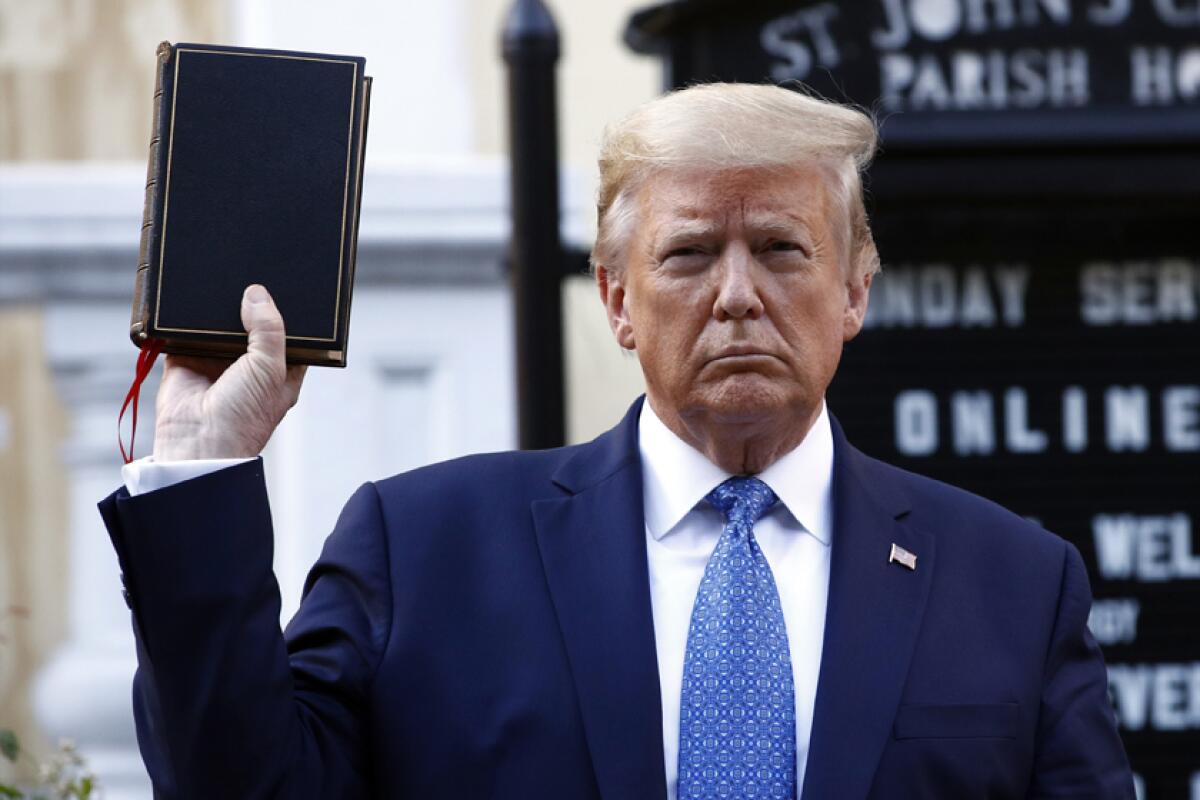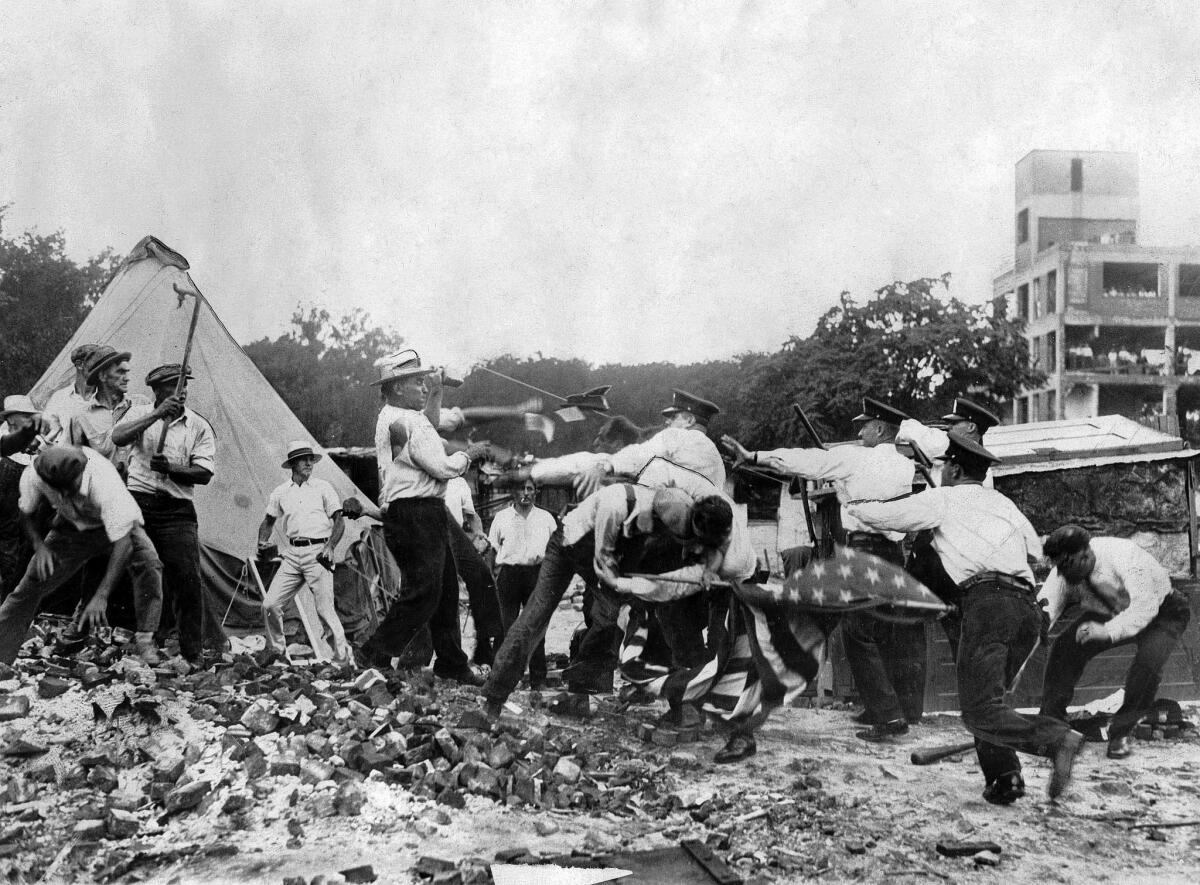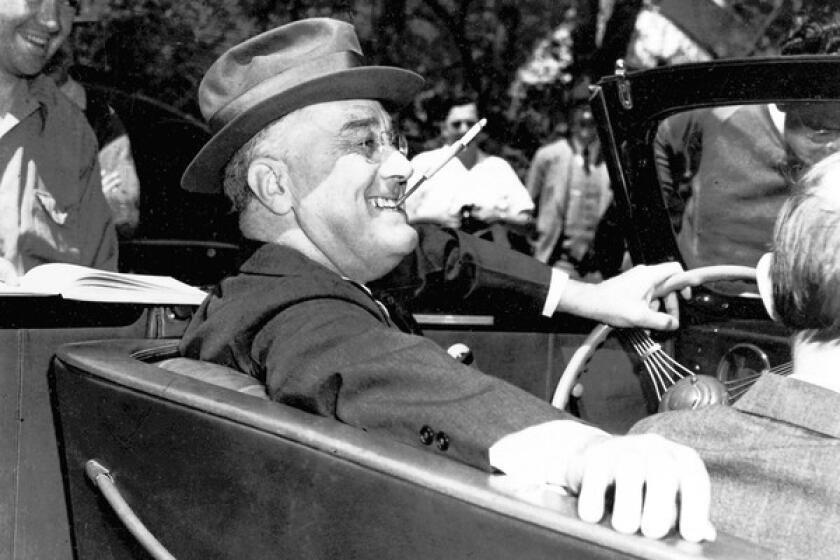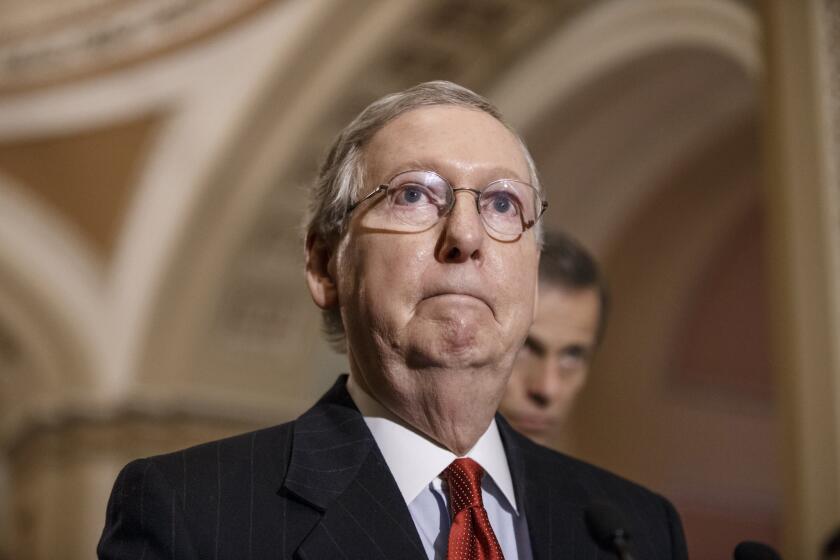Column: After Hoover’s police, like Trump’s, assaulted peaceful protesters, he lost reelection. Will Trump?

On Monday evening, National Guard units accompanied by other federal law enforcement detachments fired rubber bullets, flash-bang grenades and tear gas canisters into crowds demonstrating across the street from the White House against police killings of unarmed black people.
This was done evidently at the behest of the Trump administration so the president and his aides could stroll safely to the steps of a nearby church for a photo opportunity, in which he was snapped hoisting a Bible in his hand.
The events provoked widespread disgust and outrage. Some people wondered when a president had ever ordered an assault on peaceful demonstrators for political purposes.
Well, Felix, this elects me.
— Franklin Roosevelt to Felix Frankfurter after President Hoover’s attack on the Bonus Army
Time for a history lesson.
The answer is 1932. The president was Herbert Hoover. Let’s examine that moment, not merely for its historical parallels, but for the illustrious names involved and a glimpse of the political aftermath.
In July that year, Hoover could sense his prospects of reelection slipping away. The Depression was deepening. Unemployment was rising and America’s banking system was beginning to collapse.
Hoover had run unopposed and won the Republicans’ nomination for a second term at the party’s convention in mid-June, but it had been a dispirited affair. A “Dump Hoover” movement led by Harold Ickes, a progressive Republican from Chicago, had briefly bubbled to the surface, but died out for lack of a candidate willing to take up the colors.
Two weeks later, the Democrats had given the presidential nomination to New York Gov. Franklin D. Roosevelt, who immediately launched a pitiless attack on Hoover’s record.
Meanwhile, the Bonus Army arrived in Washington.
FDR’s New Deal aimed not to stimulate the economy, but protect families from hardship.
This bedraggled force comprised World War I veterans and family members. Congress had awarded the veterans bonus certificates in 1924 for their combat service. The certificates, however, were not redeemable until 1945. The burgeoning joblessness of the Depression prompted them to march to demand that the bonus become immediately payable.
As the main camp of the Bonus Army in the swampy Anacostia Flats on the fringes of Washington swelled to 10,000 in mid-June, the Democratic-controlled House passed a measure to pay the bonus. But it was overwhelmingly defeated in the Republican Senate.
Washington remained on edge as the marchers remained in camp and rumors swirled that the gathering was instigated by Communists. Finally, on July 28, Hoover ordered his secretary of war, Patrick Hurley, to break up the encampment.

Hurley passed on the order to the Army chief of staff, Gen. Douglas MacArthur. One contingent of cavalry deployed for the action was led by George S. Patton, then a major. Another officer looking on was MacArthur’s staff aide, Maj. Dwight D. Eisenhower, who claimed later that he had advised MacArthur against personally leading the charge.
But MacArthur smelled blood. He would boast after the attack that he had quelled an “incipient revolution” by insurrectionists. But the violence of the assault on peaceful civilians by infantry and cavalry backed by tanks and armed with bayonets and tear gas appalled the nation.
Reports from the front of the toll, the slain reportedly including an infant born during the march, dominated the front pages. (Two deaths were documented from the melee, both of Army veterans.)
Time magazine described the scene:
“As the infantry moved into Bonus City gassing each wretched shack and shanty, veterans by the thousands trudged off into the night. Some carried their belongings wrapped in bundles on their backs.... A few sang old War songs. Women carried babies in their arms. Huts and lean-tos were set afire.... By midnight Bonus City, once the home of 10,000 jobless hungry men & women, was a field of roaring bonfires. President Hoover could see its fiery glow on the Eastern sky from his White House window. At dawn the place was a charred & blackened ruin.”
In Albany, N.Y., Roosevelt followed radio reports of the carnage with his friend and advisor Felix Frankfurter, a Harvard Law School professor who later would be named a Supreme Court justice.
“Well, Felix,” FDR said, “this elects me.”
It may not have been true that the attack on the Bonus Army accounted for Roosevelt’s landslide victory over Hoover just over three months later, when he won 42 states to Hoover’s six.
Without minimizing the scale of the economic plunge, it’s proper to place comparisons between today’s figures and economic situation and those of the Depression in perspective. In short: The differences are greater than the similarities.
By then the country had sunk deeper into the Depression. Hoover’s punctilious approach, in which he tried to muscle the economy back to health through a series of White House meetings with industrialists but little in the way of policy, had left the public desperate for change.
But the Bonus Army assault certainly colored the public perception of Hoover for the rest of his term. Hoover’s aides would claim that MacArthur had disobeyed Hoover’s orders by crossing into Anacostia. But matters weren’t helped by MacArthur’s post-attack grandstanding.
Eisenhower avoided the stigma of association with the attack on defenseless veterans, even though he wrote the Army’s official report on the action. His report praised the Army detachments for performing their “allotted tasks ... rapidly and efficiently but with the maximum consideration for the members of the riotous groups.”
Whether because of the Bonus Army attack or for other reasons, Eisenhower harbored disdain for MacArthur, stating in an interview late in life, “I just can’t understand how such a damn fool could have gotten to be a general.”
Officials are ‘exploring’ a plan that allows workers to get up to $10,000, but requires them to pay back funds by deferring Social Security benefits.
It’s proper to observe that Roosevelt himself, while showing more solicitude than Hoover for bonus marchers, didn’t support accelerating their bonuses.
When a second march arrived in Washington in the first months of his presidency, Roosevelt ordered them fed from 40 Army field kitchens — “food like we never knew was left in the world,” a marcher said — and provided by the Veterans Administration with transport to demonstration sites. First Lady Eleanor Roosevelt visited their camp, without bodyguards.
Congress finally voted in 1936 to pay the bonuses immediately — but had to override FDR’s veto to do so. Roosevelt did, however, give veterans an exemption from the rules governing the Civilian Conservation Corps, the first financial rescue program of the New Deal, which otherwise admitted only applicants younger than 25 and unmarried.
Whether the dismayed reaction of the American public to the 1932 attack on the Bonus Army presaged a similar reaction to Trump’s attack on demonstrators protesting police assaults on black civilians is impossible to say at this moment.
But Monday’s event evokes an adage often attributed, probably apocryphally, to Mark Twain: “History doesn’t repeat itself, but it often rhymes.”
More to Read
Inside the business of entertainment
The Wide Shot brings you news, analysis and insights on everything from streaming wars to production — and what it all means for the future.
You may occasionally receive promotional content from the Los Angeles Times.














